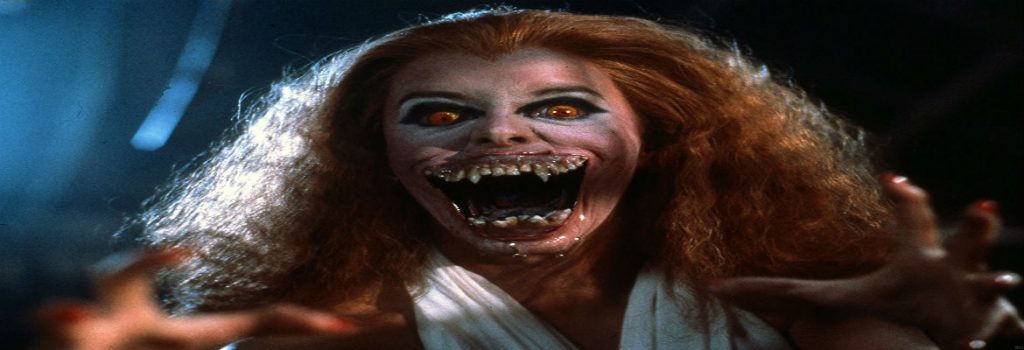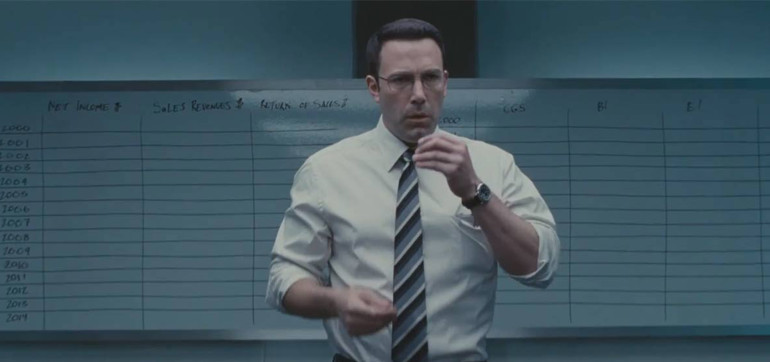Stephen King and the Horrors of Marriage
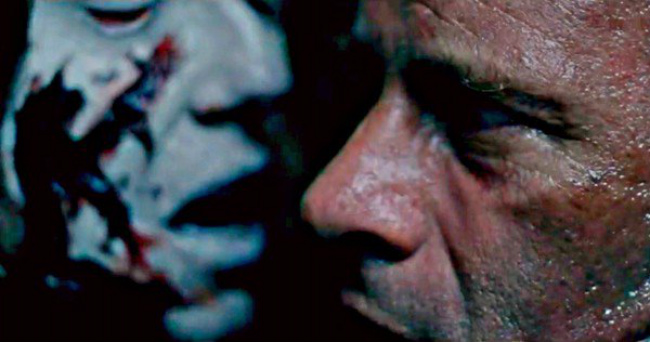
Marriage isn’t for everyone. Gerald’s Game and 1922 show viewers some marriages can be deadly.
Frank Sinatra sang love and marriage go together like a horse and carriage. Some folks have said marriage is an institution to which Mae West added, “I’m not ready for an institution yet.” Even though more marriages will end in divorce than will succeed people still take the “plunge.” Stephen King’s recent renaissance continues with two adaptions about horrible marriages going from bad to worse.
GERALD’S GAME

Gerald’s Game was built up as movie about a kinky-sex game gone bad. The book the movie was based may have had sick, twisted games between the covers, but the movie lacks a lot between the opening and closing credits. A game implies a series of events, but Netflix’s Gerald’s Game is far more tame than even the promotional posters would have us believe. What we get in Gerald’s Game is not a game, but another mediocre King adaptation.
Jessie Burlingame (Carla Gugino, Watchmen) and Gerald Burlingame (Bruce Greenwood, Star Trek) go to their summer cabin with the hope of saving their failing marriage. Like a lot of couples in the same situation, the Burlingames think they can solve their marital problems by solving things in the bedroom.

The “game” implied in Gerald’s Game consists of Gerald handcuffing Jessie to their bed. Nothing even remotely sexual happens.We do get a conversation about their failing marriage and how most of the responsibility falls on Gerald’s shoulders. After too much time is spent on Gerald’s shortcomings he dies from a heart attack. Twenty minutes later Jessie has a complete break from reality.
The prospect of being found dead, handcuffed to a bed, may cause fear and anxiety in a lot of people. We’re supposed to believe this break in reality results in Jessie talking to a tougher, stronger version of herself and to a version of her husband her mind has created. We’re also supposed to believe Jessie’s break from reality brings back long dormant memories of being molested by her father. Director Mike Flanagan (Hush) wants us to believe these things, but we’re never convinced because the script and performances aren’t believable.
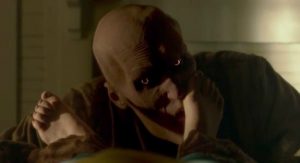
Carla Gugino has excelled in other movies and television series like Sin City, Roadies, and Watchmen. However, in Gerald’s Game she never convinces us that she’s in any real danger. We see the tears and we see her cut open her own hand to free her herself from the handcuffs, but none of it seems genuine. Gugino doesn’t even show fear when a death like figure appears in her bedroom. It’s a cheat when we learn the death like figure was real and was arrested later for other crimes.
She’s not showing fear because she has transformed herself into a strong willed woman. Quite the contrary. She still has to be reminded by her phantom husband that death is near. Gugino’s not showing fear because her performance, like the material, is flat. We never know why Jessie thinks confronting the man in court will heal her mental and physical wounds.

Gerald’s Game represents everything that could go wrong when adapting a Stephen King novel into a movie. First, the movie is loosely based on the source material. Second, the writers didn’t know what to keep, what to add, and what to flesh out. Gerald’s Game isn’t scary and it’s not suspenseful, It barely makes the point that some people’s future choices are determined by the events in their childhood. At best, Gerald’s Game is a 2-hour time filler.
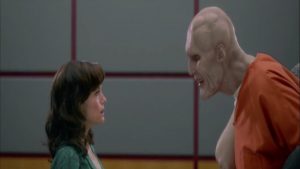
1922
Shortly after the release of Gerald’s Game Netflix released another King adaptation. 1922, based on the novella in Full Dark, No Stars, is also about a marriage gone bad. Unlike Gerald’s Game the consequences in 1922 can’t be solved by facing a giant in a courtroom.

As the title implies, 1922 is set in a day and age when women didn’t have as many freedoms as they have today. It was only two years before women were given the right to vote. Men controlled many aspects of a woman’s life. Women had even less rights once they were married. Although by the 20s women legally had property rights it wasn’t always as simple as doing what you wanted. This “gray area” is where Arlette James (Molly Parker, House of Cards) finds herself in at the beginning of 1922.
When Arlette goes to her husband Wilfred James (Thomas Jane, The Punisher) to tell him she wants to sell the farm her father left her after his death she isn’t looking for permission. However, if he agrees it would make selling the farm a lot easier. To compound matters, Arlette also wants a divorce.

Wilfred isn’t presented as a wife beater or someone who is cruel to his wife. If anything, Arlette’s problem with her husband is the fact that he’s happier in the country and on the farm and Arlette wants to live in the city. Wilfred is also stubborn, very stubborn. Arlette isn’t a shrinking violet. She openly argues with Wilfred about selling the farm and who their son, Henry, will live with after they divorce. She even flaunts her affairs in front of his face. The combination has volatile results.
Wilfred does the only thing he thinks he can do-he decides to murder his wife. Even worse, he convinces Henry to help him commit the act. Wilfred may not have been a wife beater, but he manipulated his son into thinking murder was the only thing they could do to keep the farm and stay together. Wilfred also successfully convinces the authorities and neighbors that Arlette left him and Henry. However, Wilfred learns later that everything comes with a price.
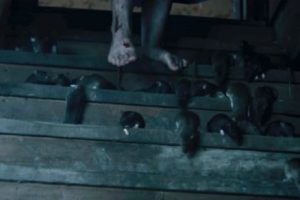
If there’s a message at the heart of 1922 it’s that karma is a bitch. Everything that happens to Wilfred is a direct result of murdering his wife. Thomas Jane, no stranger to staring in King projects, plays Wilfred not as a maniac, but a man slowly losing his grip on his sanity. He realizes just a bit too late it would have been easier to agree with Arlette than send him and his son down paths with bad endings.
The supporting cast in 1922 is just as important as Thomas Janes’ main role. Molly Parker created a character that maybe a little to intimidating for an early 20th century man. Her presences is felt through the entire movie. It’s also nice to see Neal McDonough play against type. McDonough plays fellow farmer Harlan Cotterie who’s life is forever changed by Wilfred’s actions.

1922 may not be a horror movie in the way that most of think of horror movies. 1922 is more of psychological study than a horror movie. Wilfred’s actions may be horrific, but it’s the slow burn to the end of the movie that will disturb most viewers. We can see how one bad action leads to another which leads to another. Unlike Gerald’s Game, 1922 will stick with you and have you thinking about what the movie is trying to do and say.
If you can only watch one of these movies make it 1922. Both are streaming on Netflix so you can decided for yourself which is the stand out King adaptation. Let us know what you think.




